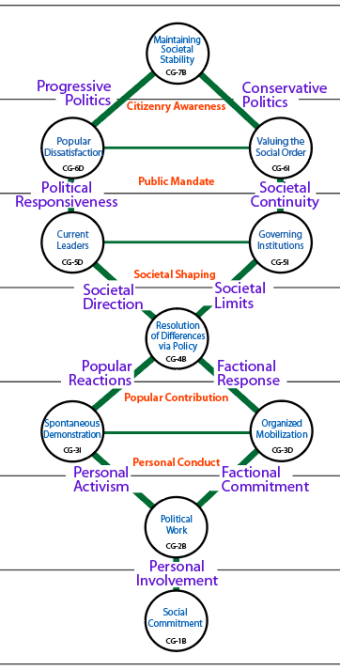Flows of Influence in Society
Citizenry Awareness
The citizenry of any society tend to fall into two camps: those that accept and defend the status quo expressed in , and therefore provide a base for conservative-oriented politicians; and those that focus on current frustrations and and look for politicians who campaign for progress through reforms that are may be more or less radical. This corresponds to the two channels of influence between and .

↔ : When interacts with the result is Conservative Politics
↔ : When interacts with a focus on , the result is: Progressive Politics
Public Mandate
The potential Channels here are fourfold.
↔ : The public mandate based on and operating society’s is about ensuring Societal Continuity. Governance is the mechanism for continuity and the social order is the expression of continuity.
↔ : The public mandate based on society’s is about expecting Political Responsiveness. are expected to respond to , and highlights willing to identify and deal with it.
However, the other two Channels do not exist:![]() More
More
Societal Shaping
Society is shaped by the current leadership developing policies using mechanisms provided by the governance institution.
↔ : Society's provide the mechanisms and powers to develop, sanction and implement which limits society in the face of conflict over issues. As usual it is a two-way influence because choices in may limit the .
This channel is labeled: Societal Limits.
↔ : Society's provide the energies that instigate and review to handle differences of view. Targeted inquiries affect in their handling of conflicts.
This channel is labeled: Societal Direction.
Popular Contribution
People can contribute to policy formulation if they are prepared to learn about proposals and ready to respond publicly in some fashion. There are two alternatives.
↔ : may generate an when a particular group or section of society is concerned about the impact. Likewise, such a faction may with the express aim to generate or influence .
This channel is labeled: Factional Responses.
↔ : may also generate if individuals are shocked, and around some issue may generate awareness of differences the need for .
This channel is labeled: Popular Reactions.
Personal Conduct
All engaged in political work are sensitized to societal developments and therefore oriented to either take personal action in regard to the failing of a societal institution or to join in with factional efforts to foster policies serving those sectional values.
↔ : A person engaged in will be encouraged and even expected to identify with an interest group and participate if requested when their .
This channel is labeled: Factional Commitment.
↔ : Any expresses active public engagement related to a person's . Being a is accompanied by a desire to be publicly associated with positions on issues of the day.
This channel is labeled: Personal Activism.
Personal Involvement
At the base of the Tree, participation in the political life of society is manifested by ensuring that the everyday expected of all citizens actually leads to some becoming a . Once that happens, a person is deeply involved with societal issues and societal institutions.
↔ : This channel is labeled: Personal Involvement.
-
With inter-Level influences clarified, interactions that by-pass a Level need investigating. In the context of popular pressures for change, the issue seems to be about resolving the heightening of tensions.
OR
- Skip the Channel-development and see the end result and review.
Originally posted: Aug-2009; Last updated: 15-Nov-2010. Amended: 15-Nov-2023.